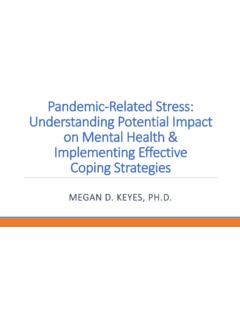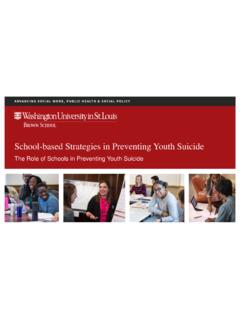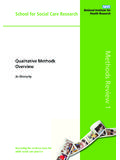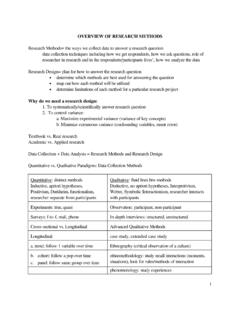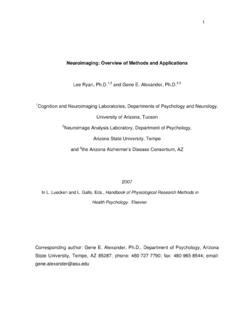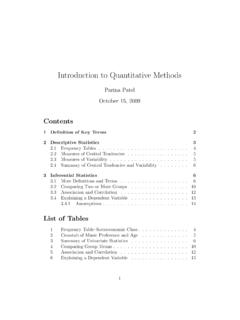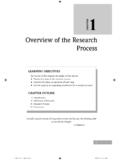Transcription of S55-5000: Research Methods - WUSTL Brown School
1 S55- 5000 : Research Methods This course overview is being provided by the lead instructor and may be used for reference as you prepare for the Research Methods proficiency exam. The exam is designed to measure your knowledge of the course domains and core competencies which are standard across sections of the course. Specific course content may vary by instructor, therefore course syllabi are not provided. COURSE overview : Research Methods focuses on concepts and skills underlying a scientific and systematic approach to public health practice;. emphasizes evaluation of practice at a variety of levels (individual, group, organization, community); stresses the understanding the application of Research to practice and developing the abilities to critically evaluate and apply Research findings.
2 The lead instructor is Amy Eyler, PhD, Associate Professor. COURSE DOMAIN AND BOUNDARIES: This course has three main goals: 1. Students will understand the basics of public health Research . Core Research concepts are presented including specification, design, data collection, measurement, survey design, bias, qualitative and quantitative Research , clinical Research (multi-subject and single subject), use of computers in data retrieval, data management and data analysis, Research implementation, interpretation, and dissemination. 2. Students will understand how Research is used in evidence based practice. This includes the ability to frame empirically answerable questions, locate data relevant to those questions, critically evaluate such data, and apply it to practice situations.
3 3. Students will develop a deeper understanding of the Research process through designing and executing a Research project. Tell me, I'll forget. Show me, I'll remember. Involve me, I'll understand Chinese Proverb As core components of the course, values are explored and ethics are taught as they apply to Research , and the intertwined nature of diversity, health, social, and economic justice, and Research is presented and explored. COURSE PEDAGOGICAL ELEMENTS: Pedagogical elements common to all sections of this course include: 1. This course includes in-class demonstrations of computerized information retrieval systems. These are shown at general ( Wikipedia and/or Google), scientific ( Google Scholar, PsychInfo), and specialty ( Cochrane Collaboration, NGO) levels.
4 Students will complete assignments demonstrating mastery of the above kinds of search engines. 2. Instructors will demonstrate critical evaluation of existing Research which is relevant to public health practice. Students will complete assignments demonstrating their ability to criticize existing Research at a basic level. 3. Students will complete a group Research project demonstrating their ability to formulate a question, choose and execute a design, implement the Research , analyze and interpret resultant data, and create a product in a format fit for dissemination ( PowerPoint, poster, paper, agency presentation, etc.). 4. Instructors will demonstrate/model the Research process, showing how specific field-generated questions can be (1) formulated and operationalized, (2) how best available evidence can be located, and (3) critically evaluated, and applied to practice.
5 5. Instructors will provide students with examples of critical ethical failures in the history public health Research . Students will demonstrate compliance with ethical standards in their assignments. CORE COMPETENCIES: Area Core Competencies Transdisciplinary problem Understand public health problems from a transdisciplinary perspective. solving Evidence-based public health Identify sources and quality of evidence-based information related to public health planning, Research , policy, and practice. (Primary). Understand the Methods of and barriers to translating scientific evidence to public health practice. Biostatistics Apply descriptive and inferential techniques according to the type of study design for answering a particular Research or practice question Conduct clear and effective graphical and tabular summaries of basic statistical analysis Epidemiology Evaluate the strengths and limitations of an epidemiology study in terms of appropriateness of study design, data collection, analysis, and random and systematic errors.
6 Communications & Understand how to capture, synthesize, communicate and disseminate ideas and informatics data to diverse stakeholders to influence public health policy and practice. Program planning Design monitoring and evaluation plans to capture outcomes and impacts of public health program or policies. Leadership, professionalism Demonstrate professional demeanor in behavior and communication. & ethics Describe, comprehend, and adhere to the basic principles of ethics analysis ( the Public Health Code of Ethics) pertaining to the collection, maintenance, and use of public health information. Diversity, Culture, and Health Understand the impact of context such as gender, race, poverty, history, migration, Disparities and culture in public health policy and practice.
7 Develop public health programs and strategies that are responsive to the cultural values and traditions of diverse communities being served. READINGS: Please note, these readings may vary across sections; this is a sample from the lead instructor's syllabus. Resources Orcher, Lawrence T. Conducting Research : Social and behavioral science Methods . Routledge, 2016. Levy, Patricia. Research Design. Guilford Press, 2017. Corbin, Juliet, Anselm Strauss, and Anselm L. Strauss. Basics of qualitative Research . Sage, 2014. Burch, Patricia and Heinrich, Carolyn J. Mixed Methods for policy Research and program evaluation. Sage, 2016. Supplemental Resources (on reserve at the Brown School Library). Bernard, (2006).
8 Research Methods in Anthropology: Qualitative and Quantitative Approaches. (4th Ed). Oxford, United Kingdom: AltaMira Press. Booth, , Colomb, , & Williams, (2008). The Craft of Research . (3rd Ed). Chicago, IL: University of Chicago Press. Galvan J. (2006). Writing literature reviews: a guide for students of the social and behavioral sciences. (3rd ed.). Glendale, CA: Pyrczak Publishing.
